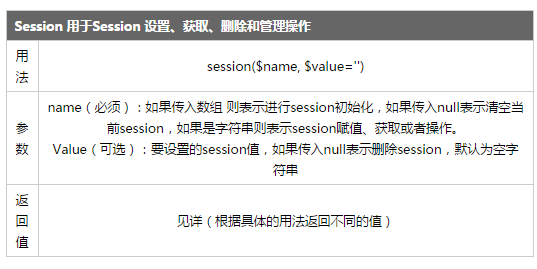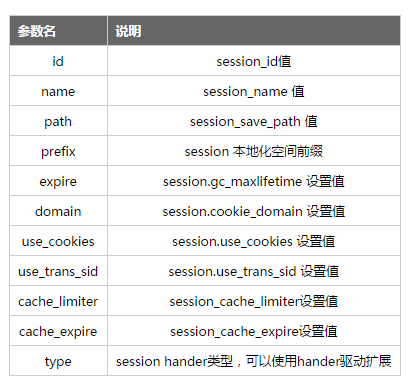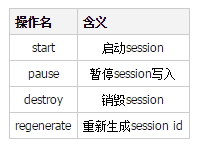 php教程
php教程
 PHP开发
PHP开发
 A short tutorial on how to let thinkphp automatically complete session assignment in the model
A short tutorial on how to let thinkphp automatically complete session assignment in the model
A short tutorial on how to let thinkphp automatically complete session assignment in the model
I believe that users who have used thinkphp know that thinkphp's model can complete many auxiliary functions, such as automatic verification, automatic completion, etc. Today, during development, I encountered the function of getting the session value
and then automatically assigning the value in the automatic completion. Please see the code for details. ;
class ArticlelModel extends Model {
protected $_auto = array (
array('addtime','time',1,'function'),
array('username','getName',1,'callback')
);
//这个函数获取session里的name值
protected function getName(){
return $_SESSION["name"];
}
}
You need to pay attention to the difference between the last parameter function and callback here;
function: When using a function, it will automatically go to Common/common.php to find the corresponding function;
callback: Use the callback method defined in the current model

The session function is a diversified operation function. Passing in different parameters can complete different functional operations, including the following functions. [-more-]
session initialization settings
If the name parameter of the session method is passed into an array, it means session initialization settings, for example:
session(array('name'=>'session_id','expire'=>3600 ));
Supported incoming session parameters include:

Session initialization setting method does not need to be called manually. It will be called automatically after the initialization work of the App class is completed. Usually the project only needs to configure the SESSION_OPTIONS parameter. The SESSION_OPTIONS parameter The setting is an array, and the supported index names are the same as the previous session initialization parameters.
By default, the system will automatically start the session after initialization. If you do not want the system to automatically start the session, you can set SESSION_AUTO_START to false, for example:
'SESSION_AUTO_START' =>false
After turning off automatic startup, you can use the public files of the project or in the controller Start the session by manually calling session_start or session('[start]').
session assignment
Session assignment is relatively simple, use it directly:
session('name','value'); //设置session
is equivalent to:
$_SESSION['name'] = 'value';
session value
Session取值使用: $value = session('name'); 相当于使用: $value = $_SESSION['name'];
session deletion
session('name',null); // 删除name 相当于: unset($_SESSION['name']); 要删除所有的session,可以使用: session(null); // 清空当前的session 相当于: $_SESSION = array();
session judgment
To determine whether a session value has been set , OK Use
session('?name');
Used to determine whether the session value named name has been set
Equivalent to:
isset($_SESSION['name']);
session management
session method supports some simple session management operation, the usage is as follows:
session('[operation name]');
Supported operation names include:

Usage examples are as follows:
session('[pause]'); // Pause session Write
session('[start]'); // Start session
session('[destroy]'); // Destroy session
session('[regenerate]'); // Regenerate session id
Localization support
If you pass in the prefix parameter when initializing the session settings or set the SESSION_PREFIX parameter separately, you can enable localized session management support. After starting the localized session, all assignment, value acquisition, deletion and judgment operations will automatically support the localized session.
After localized session support is turned on, the generated session data format changes from the original
$_SESSION['name'] to $_SESSION['prefix']['name']
Assuming the prefix is set to think, then assign a value Operation:
session('name','value'); //Setting session
is equivalent to:
$_SESSION['think']['name'] = 'value';
Value operation:
$value = session('name');
equivalent to using:
$value = $_SESSION['think']['name'];
Delete operation:
session('name',null);
equivalent to :
unset($_SESSION['think']['name']);
Clear operation:
session(null);
Equivalent to:
unset($_SESSION['think']);
Judgment operation :
session('?name');
Equivalent to:
isset($_SESSION['think']['name']);
More related articles on how to let thinkphp automatically complete session assignment in the model. Please pay attention to PHP Chinese website!

Hot AI Tools

Undresser.AI Undress
AI-powered app for creating realistic nude photos

AI Clothes Remover
Online AI tool for removing clothes from photos.

Undress AI Tool
Undress images for free

Clothoff.io
AI clothes remover

AI Hentai Generator
Generate AI Hentai for free.

Hot Article

Hot Tools

Notepad++7.3.1
Easy-to-use and free code editor

SublimeText3 Chinese version
Chinese version, very easy to use

Zend Studio 13.0.1
Powerful PHP integrated development environment

Dreamweaver CS6
Visual web development tools

SublimeText3 Mac version
God-level code editing software (SublimeText3)

Hot Topics
 1379
1379
 52
52
 How to set session timeout in SpringBoot Session
May 15, 2023 pm 02:37 PM
How to set session timeout in SpringBoot Session
May 15, 2023 pm 02:37 PM
The problem was found in the springboot project production session-out timeout. The problem is described below: In the test environment, the session-out was configured by changing the application.yaml. After setting different times to verify that the session-out configuration took effect, the expiration time was directly set to 8 hours for release. Arrived in production environment. However, I received feedback from customers at noon that the project expiration time was set to be short. If no operation is performed for half an hour, the session will expire and require repeated logins. Solve the problem of handling the development environment: the springboot project has built-in Tomcat, so the session-out configured in application.yaml in the project is effective. Production environment: Production environment release is
 How to solve session failure
Oct 18, 2023 pm 05:19 PM
How to solve session failure
Oct 18, 2023 pm 05:19 PM
Session failure is usually caused by the session lifetime expiration or server shutdown. The solutions: 1. Extend the lifetime of the session; 2. Use persistent storage; 3. Use cookies; 4. Update the session asynchronously; 5. Use session management middleware.
 Solution to PHP Session cross-domain problem
Oct 12, 2023 pm 03:00 PM
Solution to PHP Session cross-domain problem
Oct 12, 2023 pm 03:00 PM
Solution to the cross-domain problem of PHPSession In the development of front-end and back-end separation, cross-domain requests have become the norm. When dealing with cross-domain issues, we usually involve the use and management of sessions. However, due to browser origin policy restrictions, sessions cannot be shared by default across domains. In order to solve this problem, we need to use some techniques and methods to achieve cross-domain sharing of sessions. 1. The most common use of cookies to share sessions across domains
 What should I do if the php session disappears after refreshing?
Jan 18, 2023 pm 01:39 PM
What should I do if the php session disappears after refreshing?
Jan 18, 2023 pm 01:39 PM
Solution to the problem that the php session disappears after refreshing: 1. Open the session through "session_start();"; 2. Write all public configurations in a php file; 3. The variable name cannot be the same as the array subscript; 4. In Just check the storage path of the session data in phpinfo and check whether the sessio in the file directory is saved successfully.
 What is the default expiration time of session php?
Nov 01, 2022 am 09:14 AM
What is the default expiration time of session php?
Nov 01, 2022 am 09:14 AM
The default expiration time of session PHP is 1440 seconds, which is 24 minutes, which means that if the client does not refresh for more than 24 minutes, the current session will expire; if the user closes the browser, the session will end and the Session will no longer exist.
 How to solve the problem that the Springboot2 session timeout setting is invalid
May 22, 2023 pm 01:49 PM
How to solve the problem that the Springboot2 session timeout setting is invalid
May 22, 2023 pm 01:49 PM
Problem: Today, we encountered a setting timeout problem in our project, and changes to SpringBoot2’s application.properties never took effect. Solution: The server.* properties are used to control the embedded container used by SpringBoot. SpringBoot will create an instance of the servlet container using one of the ServletWebServerFactory instances. These classes use server.* properties to configure the controlled servlet container (tomcat, jetty, etc.). When the application is deployed as a war file to a Tomcat instance, the server.* properties do not apply. They do not apply,
 How to implement SMS login in Redis shared session application
Jun 03, 2023 pm 03:11 PM
How to implement SMS login in Redis shared session application
Jun 03, 2023 pm 03:11 PM
1. Implementing SMS login based on session 1.1 SMS login flow chart 1.2 Implementing sending SMS verification code Front-end request description: Description of request method POST request path /user/code request parameter phone (phone number) return value No back-end interface implementation: @Slf4j@ ServicepublicclassUserServiceImplextendsServiceImplimplementsIUserService{@OverridepublicResultsendCode(Stringphone,HttpSessionsession){//1. Verify mobile phone number if
 What are the differences between JavaScript and PHP cookies?
Sep 02, 2023 pm 12:29 PM
What are the differences between JavaScript and PHP cookies?
Sep 02, 2023 pm 12:29 PM
JavaScriptCookies Using JavaScript cookies is the most effective way to remember and track preferences, purchases, commissions and other information. Information needed for a better visitor experience or website statistics. PHPCookieCookies are text files that are stored on client computers and retained for tracking purposes. PHP transparently supports HTTP cookies. How do JavaScript cookies work? Your server sends some data to your visitor's browser in the form of a cookie. Browsers can accept cookies. If present, it will be stored on the visitor's hard drive as a plain text record. Now, when a visitor reaches another page on the site



